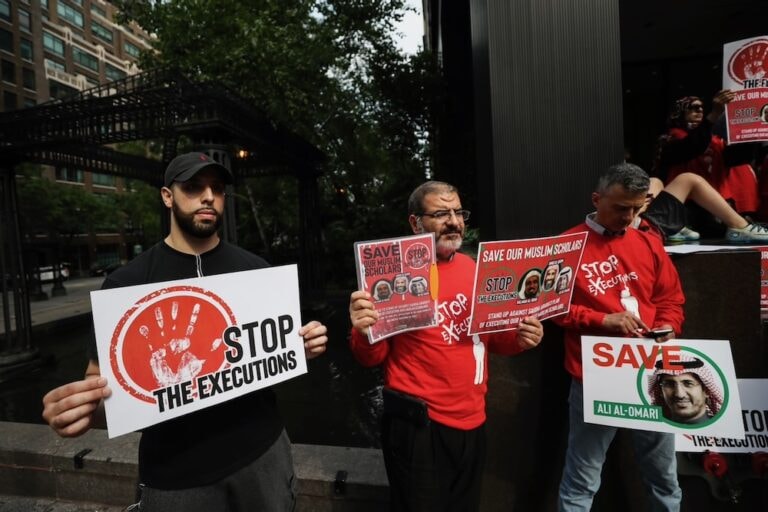(HRW/IFEX) – The following is a Human Rights Watch press release: Without Rights Reforms, Saudi Media Blitz Will Fail (New York, June 18, 2003) — Without basic human rights reforms, Saudi Arabia’s new media campaign in the United States will not change public opinion about the kingdom, Human Rights Watch said today. “Continuing restrictions on […]
(HRW/IFEX) – The following is a Human Rights Watch press release:
Without Rights Reforms, Saudi Media Blitz Will Fail
(New York, June 18, 2003) — Without basic human rights reforms, Saudi Arabia’s new media campaign in the United States will not change public opinion about the kingdom, Human Rights Watch said today.
“Continuing restrictions on basic rights in Saudi Arabia are no secret,” said Hanny Megally, executive director of the Middle East and North Africa division of Human Rights Watch. “An expensive advertising and marketing blitz is no substitute for meaningful changes in how the government treats its citizens and its 5.5 million migrant workers.”
On June 9, the Saudi embassy in Washington announced the launch of a new national advertising campaign in most of the top 25 U.S. media markets. Saudi officials said the ads were “designed to help broaden American perceptions of the country and demonstrate the Kingdom’s steadfast commitment to fighting the War on Terrorism.”
Influential diplomat Prince Bandar bin Sultan, the Saudi ambassador, was quoted as saying: “Despite all of the attention we have received, few people know what Saudi Arabia looks like or appreciate how far we have come in the last thirty years. Currently, there are big changes going on in Saudi Arabia. And we want Americans to know about them.”
During a visit to Saudi Arabia in January 2003, senior Saudi government officials told a Human Rights Watch delegation that reforms were on the way, including new procedures in the criminal justice system, restraints on 4,500 state-paid religious police, and the formation of an independent human rights organization. Saudi officials did not indicate any plans to lift severe restrictions on the rights of women, guarantee religious freedom for Muslims and non-Muslims, or end punitive sanctions on perceived government critics, such as confiscation of passports and dismissal from jobs.
Human Rights Watch said that to date, the pledged reforms have largely not materialized, citing the example of a recent press crackdown.
On May 27, prominent journalist Jamal Khashoggi, editor in chief of the reformist al-Watan, was summarily dismissed from his post. Journalists at the privately-owned daily said the manager fired Khashoggi, but was carrying out a decision of the information ministry, the Associated Press reported on May 28. In Saudi Arabia, the information ministry controls the hiring and firing of top editors.
Al-Watan had maintained a critical view of the kingdom’s conservative religious establishment, including the religious police. Following the suicide bombings in Riyadh on May 12, Khashoggi assigned blame beyond the perpetrators of the attacks. “Those who committed yesterday’s crime, which will have a painful impact on the peaceful nature of our nation, are not only the suicide bombers, but also everyone who instigated or justified the attacks, everyone who called them mujahideen, even everyone who ignored this irregular direction in our religion and nature, or tried to find excuses for it,” he wrote in his column.
The firing of Khashoggi came shortly after the government authorized the creation of a journalists association, one of several highly touted reforms. Top editors held a first meeting in March 2003 and announced that the association’s goals included “improving the standards of the profession, organizing its activities, and protecting the rights of the journalists,” the Saudi daily Arab News reported on May 26.
“Reforms on paper do not amount to much if the government’s practices remain unchanged,” said Megally. “Allowing journalists to organize is a positive development, but not if it is accompanied by continued intimidation of independent members of the profession.”
Human Rights Watch also expressed concern about the pace of legal reforms, including implementation of the kingdom’s new criminal procedure code, which became law in May 2002. The code guarantees defendants the right to a lawyer during investigation and trial, and contains provisions to bring greater transparency to the criminal justice system, but it is unclear how the code is being implemented in practice. Of particular concern are thousands of men and women migrant workers who are currently imprisoned throughout the country, have little understanding of their rights in the justice system, and no effective access to legal assistance.
Human Rights Watch said that, as part of its public relations outreach efforts, the Saudi government should articulate clearly to a U.S. and international audience the steps that are being taken to change practices that restrict fundamental human rights.
Human Rights Watch called on Crown Prince Abdullah and other senior officials to make public commitments to:
· End harassment of journalists and writers, and guarantee freedom of expression
· Afford all residents of the kingdom the right to freedom of association without government control or interference
· Permit the establishment of independent women’s rights organizations
· Allow domestic and international human rights monitoring of the criminal justice system, particularly cases of individuals who have been sentenced to death or are facing the death penalty or limb amputation (Human Rights Watch opposes in all circumstances the death penalty and limb amputation as inherently cruel)
· Guarantee religious freedom to everyone in the kingdom, and remedy discrimination based on religious belief
· Afford greater protection to migrant workers by endorsing the International Convention on the Protection of the Rights of All Migrant Workers and Members of Their Families and implementing its provisions
To read more on human rights issues in Saudi Arabia, please see: http://www.hrw.org/mideast/saudiarabia.php


